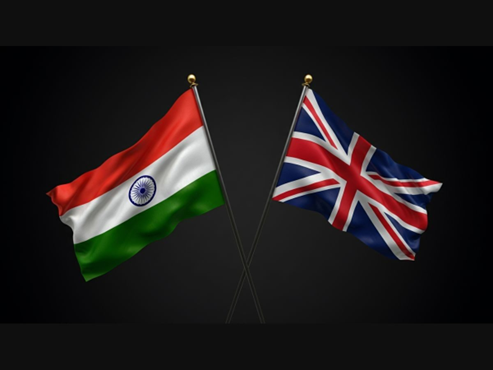India and the United Kingdom will sign a landmark Free Trade Agreement (FTA) on during Prime Minister Narendra Modi’s visit to the United Kingdom. This comes after nearly three years of negotiations. FTA, India’s first major bilateral trade agreement with a developed economy in over a decade, is expected to come into force after legal clearances from the British Parliament and India’s Union Cabinet, likely within a year.
India-UK Free Trade Agreement Who Gains What ?
Why In News
- India and the United Kingdom will sign a landmark Free Trade Agreement (FTA) on during Prime Minister Narendra Modi’s visit to the United Kingdom. This comes after nearly three years of negotiations. FTA, India’s first major bilateral trade agreement with a developed economy in over a decade, is expected to come into force after legal clearances from the British Parliament and India’s Union Cabinet, likely within a year.

India’s Concessions:
- Alcoholic Beverages: Import duties on Scotch whisky and gin to fall from 150% to 75% immediately and to 40% over 10 years.
- Automobiles: Tariffs on UK-made cars, currently exceeding 100%, will be reduced to 10% under a quota system.
- Other Goods: Tariff cuts on a range of UK products including cosmetics, salmon, chocolates, biscuits, and medical devices.
UK’s Concessions
- Indian Exports: 99% of Indian products will receive duty-free access to the UK market, covering nearly all of India’s current trade value.
Winners In Indian Industry
- Sectors likely to benefit from the FTA include textiles, footwear, auto components, gems and jewellery, furniture, sports goods, chemicals, and machinery. Many of these currently face tariffs between 4% and 16% in the UK. Indian manufacturers of electric and hybrid vehicles will also gain preferential access under a new quota system.
- In Some Indian firms that are set to benefit:
- Textiles/Apparel: Welspun India, Arvind Ltd.
- Footwear: Bata India, Relaxo.
- Automobiles and EVs: Tata Motors, Mahindra Electric.
- Engineering: Bharat Forge.
British Government Projections
- British government projections suggest the FTA could increase the UK’s GDP by £4.8 billion (Rs 56,150 crore) annually over the long term. British consumers are expected to benefit from lower prices on Indian garments, footwear, and food products. India to reduce tariffs on nearly 90% of UK goods.
- UK-based firms such as Diageo (Scotch whisky) and British luxury carmakers like Aston Martin and Jaguar Land Rover (owned by Tata Motors) are expected to benefit significantly from improved access to India’s growing consumer market.
Progressive Commitments
- In FTA also includes progressive commitments in the services sector and mobility:
- Short-Term Entry: The UK will offer temporary access for Indian yoga instructors, chefs, musicians, and other contractual service providers.
- Social Security Exemption: Indian professionals posted in the UK will be exempt from paying social security contributions for up to three years. This will potentially save Rs 4,000 crore annually.
- Government Procurement: UK companies will be allowed to bid on non-sensitive federal government procurement tenders in India above Rs 2 billion. This opens up access to nearly 40,000 tenders worth approximately Rs 4.09 lakh crore per year, according to UK estimates
Benefits Of FTA
- The deal aims to strengthen bilateral investment flows:
- Indian Presence in UK: Over 1,000 Indian companies currently operate in the UK, employing more than 1 lakh people and investing around $20 billion (Rs 1.73 lakh crore).
- UK Investment in India: The UK has invested close to $36 billion (Rs 3.11 lakh crore) in India, making it the sixth-largest foreign investor.
- PM Modi, on his fourth visit to the UK since taking office in 2014, will hold talks with his British counterpart Keir Starmer on issues spanning trade, energy, health, education, and security.








